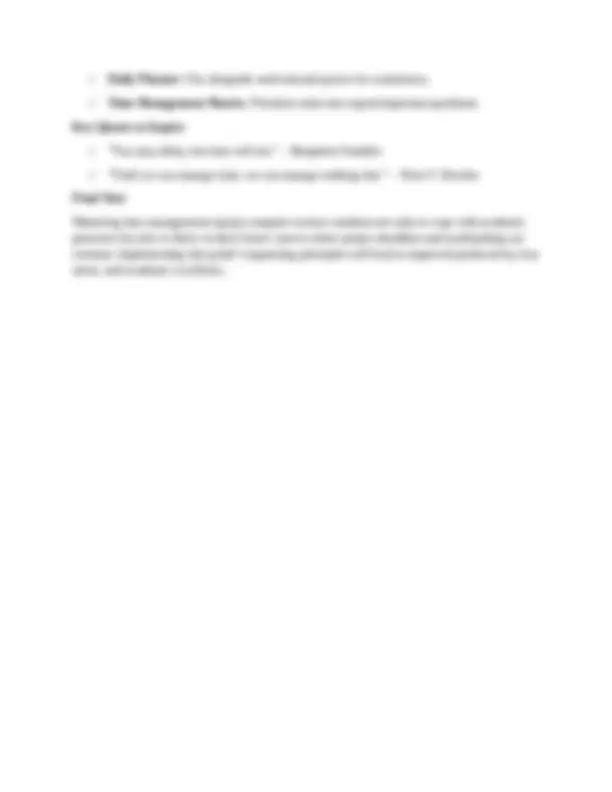



Study with the several resources on Docsity

Earn points by helping other students or get them with a premium plan


Prepare for your exams
Study with the several resources on Docsity

Earn points to download
Earn points by helping other students or get them with a premium plan
Community
Ask the community for help and clear up your study doubts
Discover the best universities in your country according to Docsity users
Free resources
Download our free guides on studying techniques, anxiety management strategies, and thesis advice from Docsity tutors
This study guide, "Time Management Guides for Computer Science Students," is tailored for BSc Computer Science Semester 1 students at Tech University (2025). It offers in-depth coverage of essential time management strategies, including time tracking, daily scheduling, priority setting (Eisenhower Matrix), task breakdown, SMART goals, use of planners, digital calendars, distraction minimization, and work-life balance techniques like Pomodoro. The guide is organized for clarity and practical application, featuring templates and motivational tools. Designed to enhance focus, reduce stress, and boost academic performance, it serves as a valuable resource for students and educators alike. Authored by an educational specialist, it aligns with university standards and supports STEM students in mastering the time demands of their coursework and projects, promoting productivity and well-being.
Typology: Study Guides, Projects, Research
1 / 3

This page cannot be seen from the preview
Don't miss anything!


Study Guide: Time Management Guides for Computer Science Students Tech University | BSc Computer Science - Semester 1 Date: Wednesday, July 16, 2025 Introduction Time management is a critical skill for students, especially in demanding fields like Computer Science. Proper management of time improves productivity, reduces stress, and enhances learning outcomes. This guide provides comprehensive explanations of key time management topics, actionable techniques, and organized planning methods tailored for students in the computer science domain.
1. Understanding Your Current Time Use Before improving time management, track how you spend your time daily. This analysis reveals hidden time losses and productivity gaps, enabling you to build effective habits. Tools like time- tracking apps or simple diaries can help map out your activities, highlighting distractions or inefficient practices to address. 2. Daily Scheduling & Time Blocking Create a daily schedule template using the time blocking technique, where every segment of your day is allocated to specific tasks (lectures, coding practice, project work). This method enhances focus by minimizing multitasking and procrastination. For tech students, block time for coding exercises, debugging, theory study, and breaks to optimize retention and skill acquisition. 3. Prioritization Techniques Prioritize tasks according to urgency and impact (e.g., assignments with approaching deadlines or critical project milestones). Use methods like the Eisenhower Matrix or Time Management Matrix to organize tasks into urgent vs important categories. Complete high-priority and difficult tasks during your peak productivity hours. 4. Breaking Down Large Tasks Divide complex projects or study topics into smaller, manageable sub-tasks. For instance, a programming assignment can be sub-divided into research, coding modules, testing, and documentation. Completing these boosts confidence and maintains momentum while ensuring comprehensive coverage. 5. Goal Setting Set realistic and specific goals : Avoid overwhelming yourself with unrealistic expectations.
Define measurable objectives, like “Finish data structures chapter by Friday evening.” Use SMART (Specific, Measurable, Achievable, Relevant, Time-bound) criteria for clarity and motivation.
6. Use of Planners and Calendars Maintain a consolidated assignment list including deadlines, weightage, and exam dates to stay on top of multiple courses. Use weekly and monthly planners to visualize your academic workload alongside personal activities. Digital calendars (e.g., Google Calendar, Outlook) with reminders help prevent last- minute rushes and enable integration with class schedules. 7. Avoiding Distractions Identify and minimize distractions, especially digital ones like social media or gaming during study time. Use apps or browser extensions that limit time spent on distracting websites. Designate specific “focus” periods with no interruptions to maximize deep work sessions. 8. Taking Breaks and Balancing Work Incorporate short breaks between tasks to prevent burnout and maintain mental clarity. Techniques like the Pomodoro method (25 minutes work + 5 minutes rest) are effective for sustained concentration. Balance study, social, and personal time to avoid fatigue and enhance overall wellbeing. 9. Review and Adjust Your Plan Regularly Periodically review your schedule and goals to accommodate shifting priorities or unexpected events. Use a time management matrix to reflect on completed and pending tasks and plan the next steps. Stay flexible, adapting your plan as needed for optimal progress. Appendices: Templates and Tools Module Overview Template: Track syllabus and lecturer contacts. Assignments & Exam Tracker: Monitor each task’s deadline and weightage. Weekly Schedule Grid: Plan study, work, and leisure time hourly.